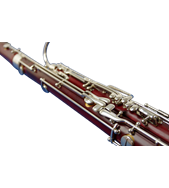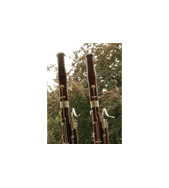Am I too old to learn the bassoon?
February 15th, 2018

Learning a musical instrument is regarded as something children do rather than adults. And it is true that more than two thirds of children play an instrument, with one third of children having lessons at any one time (peaking at half of children aged 8-10)*.
Learning an instrument as a child is obviously ideal - children learn quickly and they then have a foundation in musical capability and appreciation which will enhance their lives as adults. But what do you do if you never learnt as a child, or the instrument you learnt to play is not the one you now want to play? You can hardly turn the clock back and learn as a child, so is it too late to learn an(other) instrument as an older person?
Do adults learn the bassoon?
It is perhaps cheering that we have an encouragingly large number of adults - including a fair sprinkling of middle-aged and older people - who contact us for advice about buying a bassoon to start learning. Some of them are looking to start playing the bassoon for the first time, and others to take it up again after a gap of several decades. People in their 50s and 60s are not uncommon, with several being over 80.
The bassoon is not the sort of instrument which can be self-taught easily, so lessons are necessary if meaningful progress is to be made. According to ABRSM, the percentage of adults taking music lessons at any one time declines steadily from 12% of 25-34 year olds to 1% of 55-64 year olds, and less than that at 65 or over.
I would estimate that many more than 1% of our customers, for example, are 55-64 year olds taking up the bassoon for the first time. Therefore, the bassoon is unusually appealing to older people compared with the “average” instrument, making adult bassoon learners part of a very select group!
Why do adults learn the bassoon?
There are many reasons adults start to learn the bassoon.
Some start because the bassoon is an orchestral instrument in demand by amateur orchestras, so it is easy for a relative beginner to get into an orchestra. A sub-text is possibly that the motivation to play an instrument in later years is social as well as the challenge and pleasure of playing.
Others take it up because of a long-held desire to play the bassoon which lay latent in earlier years because of the cost, but with more disposable income it now becomes possible.
Others just have an increasingly strong feeling of "now or never" after years of thinking of it, which encourages the older person to take the plunge.
Others are looking for something which proves they still have what it takes to do something intellectually challenging which is also immensely satisfying, and learning an instrument as difficult and rewarding as the bassoon fits the bill.
Or a combination of any or all of the above.
How hard is it to learn the bassoon in middle age or older?
Once you are over the hurdle of finding the right bassoon and a teacher empathetic towards older learners, the challenge really starts.
Whether you have ever played another instrument, and whether you can read music or even sing in tune will help define your starting point, but not necessarily the degree of challenge you will be taking on as these are all hurdles it is relatively easy to overcome in the first few months.
There is one challenge nearly all adult new learners have to overcome, whatever their chosen instrument. This is based on the degree of self-expectation adults bring.
Adults are used to being successful and accomplished in their daily lives, unlike children who spend a lot of time trying to do things they have never done before. Therefore adults, unlike children, expect to be successful early on when playing an instrument. Inevitably they will be disappointed as learning a musical instrument is much, much harder than it looks and requires countless hours of practice. Disappointment can quickly change to self-doubt and despondency.
The answer is to accept that learning is a lot harder than you initially envisaged (not helped perhaps by viewing children on YouTube playing your selected instrument to an incredible standard!) and focus on the journey rather than the destination.
Make sure you enjoy the learning process and take satisfaction from small, incremental improvements with the occasional big breakthrough. If you find that your improvements are too small for weekly lessons to be worthwhile, then have fortnightly ones instead.
It is also worth bearing in mind that learning how to learn an instrument – how to practice, what to play, how long to play, and so on – is important. And no two people are the same, so you have to find the best way for you to practice rather than just relying on what works for others.
The bassoon is a complex instrument with a big range and therefore has lots of keys to press, with lots of fingerings to be learnt and practiced repeatedly. So to begin with it will be more of a challenge than a simpler instrument, and therefore the initial stages of learning will take longer. But what are the specific challenges for middle-aged and older adults learning the bassoon?
The most obvious is the physical size and weight of the instrument. Seat straps, harnesses and balance hangers can help with handling the instrument when playing. A case with back straps helps with carrying it. And plenty of cork grease to allow easy disassembly will not go amiss.
As the bassoon is such a big wind instrument it is unsurprising that it also needs plenty of air to make it work. Therefore breathing correctly to provide the air is a skill to be learned and needs a certain minimum level of fitness to provide.
Should I then take up the bassoon in middle age or older?
If you are up for a challenge, have a basic minimum level of fitness, and want an instrument you can play in an orchestra as soon as possible, then go for it. The experience of quite a few customers who bought a bassoon from us later in life is encouraging; many of them are very enthusiastic about playing and are keen to tell us how it has changed their lives.
However old you are, it is perfectly possible to learn to play the bassoon to a decent standard with plenty of practice. Just expect to go a bit slower than you would have done as a child. But rather quicker than you will go if you left it another five or ten years.
*Statistics from Making Music, Teaching, Learning and Playing in the UK, September 2014, ABRSM. See https://gb.abrsm.org/en/making-music/4-the-statistics/
Article Author: Martin Ludlow, In-House Bassoon Specialist and Director at Double Reed Ltd.




